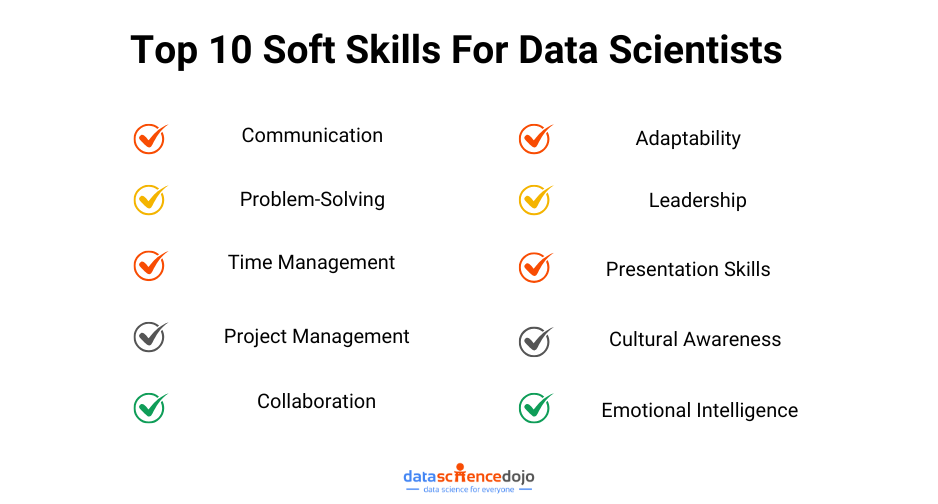As a data scientist, it’s easy to get caught up in the technical aspects of your job: crunching numbers, building models, and analyzing data. However, there’s one aspect of your job that is just as important, if not more so: soft skills.
Soft skills are the personal attributes and abilities that allow you to effectively communicate and collaborate with others. They include things like communication, teamwork, problem-solving, time management, and critical thinking. While these skills may not be directly related to data science, they are essential for data scientists to be successful in their roles.
Data Science Success: Top 10 Soft Skills You Need to Master
The human aspect is crucial in data science, not just the technical side represented by algorithms and models. In this blog, you will learn about the top 10 essential interpersonal skills needed for professional success in the field of data science.
1. Communication
The ability to effectively communicate with clients, stakeholders, and team members is essential for data science professionals working in professional services. This includes the ability to clearly explain complex technical concepts, present data findings in a way that is easy to understand and to respond to client questions and concerns.
One of the biggest reasons why soft skills are important for data scientists is that they allow you to effectively communicate with non-technical stakeholders. Many data scientists tend to speak in technical jargon and use complex mathematical concepts, which can be difficult for non-technical people to understand. Having strong communication skills allows you to explain your findings and recommendations in a way that is easy for others to understand.
2. Problem-Solving
Data science professionals are often called upon to solve complex problems that require critical thinking and creativity. The ability to think outside the box and come up with innovative solutions to problems is essential for success in professional services.
Problem-solving skills in data scientist are crucial as it allows data scientists to analyze and interpret data, identify patterns and trends, and make informed decisions. Data scientists are often faced with complex problems that require creative solutions, and strong problem-solving skills are essential for coming up with effective solutions.
3. Time Management
Data science projects can be complex and time-consuming, and professionals working in professional services need to be able to manage their time effectively to meet deadlines. This includes the ability to prioritize tasks and to work independently.
4. Project Management
Effective project management is a crucial skill for data scientists to thrive in professional services. They must be adept at planning and organizing project tasks, delegating responsibilities, and overseeing the work of other team members from start to finish. The ability to manage projects efficiently can ensure the timely delivery of quality work, boost team morale, and establish a reputation for reliability and excellence in the field.
5. Collaboration
Next up on the soft skills list is collaboration. Data science professionals working in professional services often work in teams and need to be able to collaborate effectively with others. This includes the ability to work well with people from diverse backgrounds, to share ideas and knowledge, and to provide constructive feedback.
6. Adaptability
Data science professionals working in professional services need to be able to adapt to changing client needs and project requirements. This includes the ability to be flexible and to adapt to new technologies and methodologies.
Moreover, adaptability is an important skill for data scientists because the field is constantly evolving, and techniques are being developed all the time. Being able to adapt to these changes and learn new tools and methods is crucial for staying current in the field and being able to tackle new challenges. Additionally, data science projects often have unique and changing requirements, so being able to adapt and find new approaches to problems is essential for success.
7. Leadership
Data science professionals working in professional services often need to take on leadership roles within their teams. This includes the ability to inspire and motivate others, to make decisions, and to lead by example.
Leadership is an important skill for data scientists because they often work on teams and may need to coordinate and lead other team members. Additionally, data science projects often have a significant impact on an organization, and data scientists may need to be able to effectively communicate their findings and recommendations to stakeholders, including senior management.
Leadership skills can also be useful in guiding a team towards a shared goal, making sure all members understand and support the project’s objectives, and making sure that the team is working effectively and efficiently. Furthermore, Data Scientists are often responsible for not only analyzing the data but also communicating the insights and results to different stakeholders, which is a leadership skill.
8. Presentation Skills
Data science professionals working in professional services need to be able to present their findings and insights to clients and stakeholders in a clear and engaging way. This includes the ability to create compelling visualizations and to deliver effective presentations.
9. Cultural Awareness
Data science professionals working in professional services may work with clients from diverse cultural backgrounds. The ability to understand and respect cultural differences is essential for building strong relationships with clients.
10. Emotional Intelligence
Data science professionals working in professional services need to be able to understand and manage their own emotions, as well as the emotions of others. This includes the ability to manage stress and maintain a positive attitude even in the face of challenges.
Bottom Line
In conclusion, data science professionals working in professional services need to have a combination of technical and soft skills to be successful. The ability to communicate effectively, solve problems, manage time and projects, collaborate with others, adapt to change and emotional intelligence are all key soft skills that are necessary for success in the field.
By developing and honing these skills, data science professionals can provide valuable insights and contribute to the success of their organizations.





